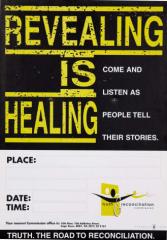 "You are a victim of torture, of harassment, of imprisonment, and we want you to tell us your story."
"You are a victim of torture, of harassment, of imprisonment, and we want you to tell us your story."
- Alex Borraine, TRC Deputy Chairperson to Singqokwana Ernest Malgas, Committee on Human Rights Violations witness, 16 April 1996, East London
The South African Truth and Reconciliation Commission (TRC) was established by the Government of National Unity, under newly-elected democratic President Nelson Mandela, to help deal with the atrocities of the apartheid era. The Commission had been enacted by the Promotion of National Unity and Reconciliation Act No 34 of 1995. On 15 April 1996, the TRC, under Chairperson Demond Tutu, opened the first set of its nation-wide hearings for both victims and perpetrators of political crimes in the East London City Hall in the Eastern Cape. On 16 April, the first victims' testimonies were heard. The first hearings set the tone for the hearings to follow, with even Tutu breaking down during one victim's testimony.
The TRC was divided into committees; each played a particular role in seeking truth, reconciliation and justice during the proceedings. These included the Committee on Human Rights Violations, Committee on Amnesty and the Committee on Reparation and Rehabilitation. Additional hearings were held, focusing on particular sectors and institutions' roles in upholding or opposing apartheid.
The Battle Against Forgetting: new SAHA educational resource
During 2011, SAHA has held educational workshops for both educators and learners on how to engage with the events surrounding the TRC, and their broader impact on the ongoing (and unfinished) business of reconciliation. Emerging from these workshops is a new educational resource, replete with reproductions of original archival material sourced from SAHA collections, provides comprehensive summaries, explanations and guidelines to enrich learner engagement with the TRC in the classroom.
The product can be freely downloaded by registered users.
Learn more and download the product.
Other SAHA products, projects and collections related to the TRC
Reflecting an ongoing commitment to the process of transitional justice envisioned by the TRC, as well as the significance of the TRC in accessing information otherwise obscured by the previous political regime, SAHA has accumulated a large number of collections related to the TRC.
The TRC archival project
Conducted from 2003 - 2006, this joint archival initiative by SAHA and Historical Papers at the University of the Witwatersrand, funded by The Atlantic Philanthropies, aimed at identifying, preserving and promoting public access to the TRC archive, and producing:
A Guide To Archival Sources Relating To The South African Truth And Reconciliation Commission identifying where in South Africa various TRC collections are located, and describing these collections; the TRC Oral History Project (AL2985), featuring interviews with 63 individuals who worked for the Commission in various capacities and in different locales; the TRACES OF TRUTH website, featuring digitised copies of key archival materials relating to the TRC housed at SAHA and Historical Papers. These materials are organised into five broad categories - background, human rights violations, amnesty, reparations, and aftermath, with accompanying narrative, in an attempt to contextualise, compare and contrast these archival fragments.
Visit SAHA's TRC Collections
TRC Special Report Multimedia Project
Between 1996 and 1998 the TRC Special Report was broadcast weekly, reporting on the different aspects of the public TRC hearings taking place across South Africa. SAHA, in conjunction with the South African Broadcasting Corporation (SABC) has developed a multimedia product that makes the work of the TRC even more accessible. SAHA is currently in the process of developing a website making the episodes, databases and related links available online.
Learn more about the TRC Special Report Multimedia Project.
Paper Wars
Edited by Kate Allan, SAHA's Freedom of Information co-ordinator from 2005 to 2007 and published by Wits University Press in 2009, Paper Wars reflects upon the work SAHA has done around testing the parameters of South Africa's freedom of information legislation, the Promotion of Access to Information Act (PAIA) and provides insight into some of the difficulties information activists and requesters have encountered as they have attempted to put South Africa's constitutional right of access to information into practice. The first two chapters can be downloaded for free by registered users on the SAHA website.
Learn more about Paper Wars.





 "You are a victim of torture, of harassment, of imprisonment, and we want you to tell us your story."
"You are a victim of torture, of harassment, of imprisonment, and we want you to tell us your story."